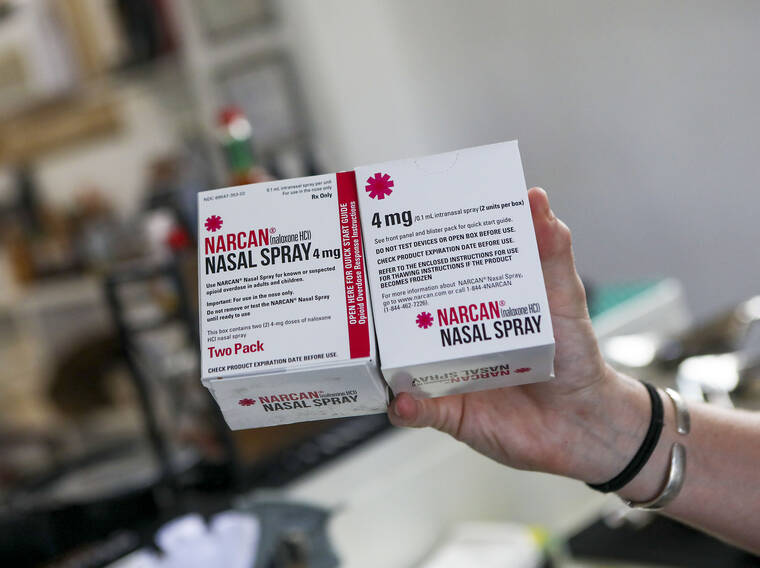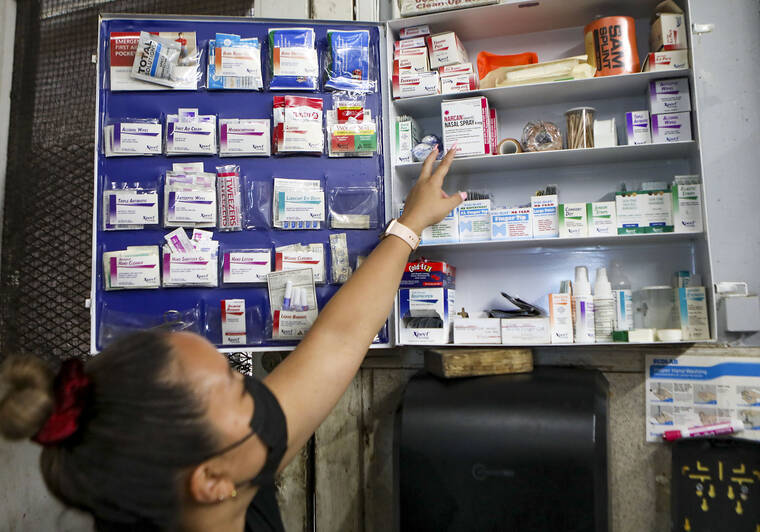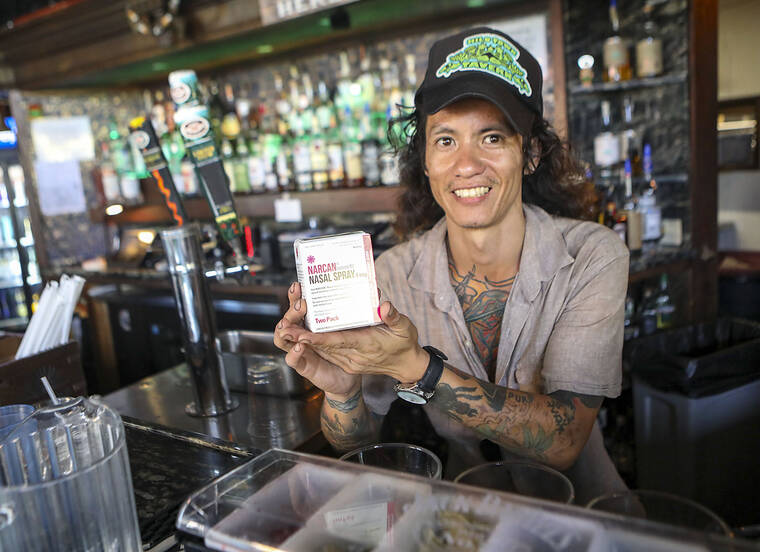Narcan distributed islandwide to reverse opioid overdoses

Kelsey Walling/Tribune-Herald An employee at The Temple Bar holds two boxes of Narcan on Thursday.

Kelsey Walling/Tribune-Herald An employee at Cronies Bar and Grill on Thursday points to the doses of Narcan in the first aid area of the kitchen.

Kelsey Walling/Tribune-Herald Dao Nguyen holds a box of two doses of Narcan on Thursday at the Hilo Town Tavern.
Over 700 doses of Narcan, a nasal spray used to reverse opioid overdoses, have been distributed to restaurants, bars, hotels and nightclubs on Hawaii Island.
Over 700 doses of Narcan, a nasal spray used to reverse opioid overdoses, have been distributed to restaurants, bars, hotels and nightclubs on Hawaii Island.
The Hawaii County Department of Liquor Control, Mayor Mitch Roth, the state attorney general’s office and other agencies helped to acquire and distribute the doses to dispenser licensees, or businesses that sell and serve alcohol.
ADVERTISING
“We sent out an email to all our licensees on the dispenser side telling them we had it available,” said Gerald Takase, director of the Department of Liquor Control. “At first, the response was a little mixed, but once they found out they didn’t have to pay for it, they all signed up.”
Takase said roughly 90% of businesses agreed to receive at least one dose of Narcan, with costs covered by the state Department of Health, the AG’s office and Kumukahi Health and Wellness Center.
Also known as naloxone, Narcan is an Federal Drug Administration-approved medication with minimal side effects that can be used to treat fentanyl overdoses, among others.
“Even if they were having some other kind of reaction, it won’t harm them any further,” Takase said.
While no official training was provided, a card on how to apply the nasal spray was distributed with the doses.
“We distributed a card that the Department of Health and the attorney general’s office had put together that’s very detailed,” Takase said. “The box that Narcan comes in also has instructions.”
When it comes to liability, Takase confirmed any application of the medicine would fall under the state’s Good Samaritan law, which legally protects individuals rendering lifesaving care at the scene of an accident or emergency.
“You’re giving it to somebody who is basically not breathing, and if you don’t do anything, that person is going to be dead,” Takase said. “Given that choice, nobody is going to look unkindly upon you.”
The initiative was inspired by an incident that occurred at Oceans Sports Bar and Grill in Kailua-Kona, where Narcan was administered to two individuals overdosing outside the bar.
“It wasn’t really clear if they were customers prior to that or not, but somebody saw them out lying on the grass, and the bartenders knew enough and had (Narcan), so they administered it,” Takase said. “They had purchased these kits on their own, and that’s what really spurred us on getting this done.”
This week, lawmakers for the City and County of Honolulu passed a bill that would make Honolulu the first U.S. city to require all bars and nightclubs to carry Narcan, but Hawaii County officials have opted for a voluntary approach.
“I know the County Council was trying to pass something like Honolulu did, but I told them, why don’t we try and do it voluntarily first,” Takase said. “Usually if you force something upon them, then you get a lot of backlash from it, and I have to say, the licensees on this island were very receptive to it.”
Several local bars on Thursday confirmed they received the Narcan, including Cronies Bar and Grill, The Temple Bar and Hilo Town Tavern.
“We got two doses,” said Alyssa Sato, a manager at Cronies Bar and Grill, adding they are kept in a first aid kit.
“I think all businesses should keep it handy, just in case,” she said. “You never know who might walk into your establishment with what problem.”
Hilo Town Tavern also confirmed the Narcan will be kept in the first aid kit.
“I think it’s better to have it than to not,” said Dao Nguyen, a server at Hilo Town Tavern. “You never know when you’re going to need it.”
The Roth administration is also looking into providing Narcan for all county facilities and vehicles, and are ensuring training measures are in place.
“The safety and well-being of our residents and visitors are of utmost importance to us,” Roth said in a statement. “By equipping our dispenser licensees with Narcan spray, we are taking a proactive approach to addressing potential opioid-related emergencies.”
Email Grant Phillips at gphillips@hawaiitribune-herald.com.


